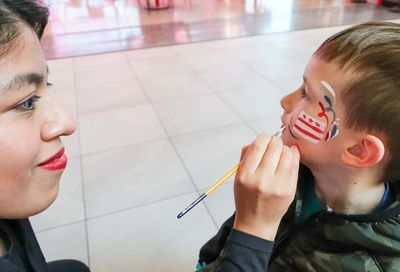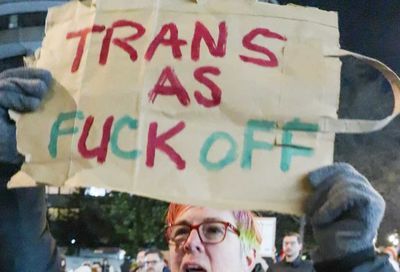Americans Oppose Anti-LGBTQ Religious-Based Discrimination
Survey finds an overwhelming majority of Americans oppose religious-based refusals in medical care, business, or employment.

A new poll finds that an overwhelming majority of U.S. adults oppose allowing individuals to justify denying services to LGBTQ people by citing their personal religious or moral beliefs.
The poll, published by the Williams Institute at UCLA School of LAW and NORC [National Opinion Research Center] at the University of Chicago, surveyed 1,003 randomly selected adults across the United States in September 2022, asking them if they would support religious-based refusals in a variety of scenarios.
The poll asked about three separate scenarios: one, in which a business owner sought to deny a public service to an LGBTQ person because of the owner’s beliefs; a second, in which a medical professional sought to withhold medical care from an LGBTQ person based on the medical professional’s beliefs; and a third, in which an employer refused to hire an LGBTQ person based on the employer’s religious beliefs.
More than 8 in 10 respondents, or 84%, said they oppose allowing medical professionals to deny health care services based on their religious beliefs. Nearly three-quarters of respondents, or 74%, opposed allowing employers to deny employment to LGBTQ individuals based on religious beliefs, while 71% of respondents opposed allowing business owners to refuse to serve LGBTQ people based on their religious beliefs.
The study found that a majority of people, across all ages, political affiliations, races, religions, and genders oppose allowing discrimination in all three scenarios.
Those most likely to support religious-based discrimination were those attending church more than once a week, 41% of whom said they would allow a business owner to refuse service to an LGBTQ person.
Differences in opinion were observed based on political affiliation, even though majorities of Americans affiliated with both major political parties still opposed religious-based refusals in the three scenarios. Ninety-two percent of Democrats opposed allowing discrimination in medical care, 90% opposed denying services to LGBTQ people, and 89% opposed discrimination in employment.
In comparison, only 71% of Republicans opposed allowing discrimination in medical care, while 54% opposed employment discrimination, and 52% opposed religious-based refusals of business services.
There were also differences based on race. While more than 80% of Black respondents opposed the use of religious beliefs to discriminate against people in all three scenarios, white people were more likely to support religious-based refusals, with only 68% of whites opposing the idea of empowering business owners to discriminate, and 71% opposing employment discrimination. However, more than 80% of white opposed medical-based refusals.
However, it should be noted that the survey did not ask specifically about denial of wedding-related services, which, in past polls, have generally earned more support from the public.
The survey’s findings appear to highlight sharp differences between public opinion in specific scenarios and the growing number of state bills seeking to limit legal protections for LGBTQ Americans in the name of protecting “religious liberty.”
Several Republican-led states have passed such bills in recent years, with Florida passing a bill earlier this year to empower health care providers by permitting them to refuse to carry out certain medical procedures or prescribe treatments — especially those related to reproductive health care, sexually-transmitted diseases, or gender-affirming treatments for transgender individuals — based on their religious beliefs.
“Recent efforts by some state legislatures to expand religious exemptions from LGBTQ-inclusive non-discrimination laws are largely out of alignment with the views of most Americans,” Christy Mallory, the legal director of the Williams Institute and the lead author of the study, said in a statement. “More than three in four Americans now favor civil rights laws protecting LGBTQ people against religiously-motivated discrimination.”
The U.S. Supreme Court is soon expected to take up a case involving religious exemptions to nondiscrimination laws. The case, 303 Creative, Inc. v. Elenis, involves a Colorado-based wedding website designer who claims her religious beliefs opposing homosexuality and same-sex marriage do not permit her to create wedding websites for same-sex couples.
Even though she has not been asked to create such a website for a same-sex couple, the designer is seeking the right to refuse service to LGBTQ people, and put up a warning on her company website that she does not serve same-sex couples. But the state of Colorado argues that doing so violates the state’s LGBTQ-inclusive nondiscrimination law.
The high court’s eventual decision is expected to rule on issues that were left unresolved by its 2018 decision in the Masterpiece Cakeshop case involving a Colorado baker’s refusal to bake a cake for a same-sex wedding. Among those issues includes the question of whether a business owner can claim a First Amendment exemption, and a religious exemption, from state nondiscrimination laws.
But regardless of how the Supreme Court rules, Michelle Johns, a senior research scientist at NORC at the University of Chicago, says public sentiment — at least at the current moment is clear.
“Our data shows that the majority of U.S. adults oppose discrimination against LGBTQ individuals,” Johns said. “And importantly, this opposition is consistent across political, religious, and racial and ethnic lines.”
Support Metro Weekly’s Journalism
These are challenging times for news organizations. And yet it’s crucial we stay active and provide vital resources and information to both our local readers and the world. So won’t you please take a moment and consider supporting Metro Weekly with a membership? For as little as $5 a month, you can help ensure Metro Weekly magazine and MetroWeekly.com remain free, viable resources as we provide the best, most diverse, culturally-resonant LGBTQ coverage in both the D.C. region and around the world. Memberships come with exclusive perks and discounts, your own personal digital delivery of each week’s magazine (and an archive), access to our Member's Lounge when it launches this fall, and exclusive members-only items like Metro Weekly Membership Mugs and Tote Bags! Check out all our membership levels here and please join us today!
























You must be logged in to post a comment.